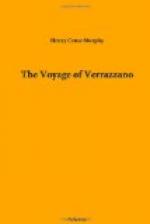Another circumstance to be remarked is, that the description, which follows, of the country said to have been discovered by Verrazzano, has not the slightest reference to the account given in the letter, but is evidently derived from other sources of discovery. Two names are attributed to it, Francese and Nurumbega, both of which owe their designation to other voyagers. Francese, or French land, appears for the first time in any publication, on two maps hereafter mentioned, printed in 1540, under the Latin form of Francisca. It is called in the manuscript cosmography and charts of Jean Alfonse, terre de la Franciscane. An earlier map by Baptista Agnese, described by Mr. Kohl, indicates that the name owes its origin, as will hereafter be pointed out, to the voyages of the French fishermen to the shores of Nova Scotia and New England. [Footnote: Discovery of Maine, p. 202, chart XIV.] Nurumbega, as the writer himself states, is an Indian name, which could not have been taken from the Verrazzano account, as that does not mention a single Indian word of any kind. The statement of the productions of the country includes oranges, which do not belong to any portion of the continent claimed to have been visited by Verrazzano, and plainly indicates an entirely different authority for that portion of the coast. It is therefore equally unaccountable why the author of the discourse should have acknowledged the discovery by Verrazzano and, at the same time, have passed over altogether the description in the letter, and sought his information in regard to the country elsewhere, when he had there such ample details, especially in connection with the great bay.
The solution of the whole difficulty is to be found in the fact that the clause relating to Verrazzano was not the work of the author of the discourse, but of another person. It is not difficult to understand how and by whom this interpolation came to be made. Ramusio had both the letter and the discourse in his hands at the same time, for the purpose of preparing them for publication, recomposing the one, as has already been shown, and translating the other from the French into the Italian, as he himself states. In the execution of the former of these tasks, he took the liberty of altering the letter, as has been proven, by substituting the phrase of, the land discovered by the Bretons, for that of, the country explored by the Portuguese, as the northern limit of the voyage of Verrazzano; thereby removing the objection, to which the letter was obnoxious, of entirely ignoring the discoveries of the Bretons, which were distinctly asserted in the discourse. In order to conform to the Verrazzano letter, as it was thus modified, it was necessary to insert this clause in the discourse, which would else to contradict the letter entirely. The two alterations, however necessary they were to preserve some consistency between the two documents, are, nevertheless, both alike repugnant to the original letter.




